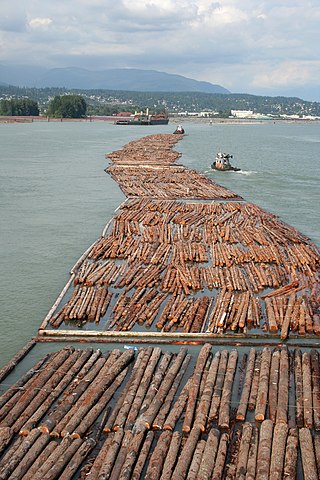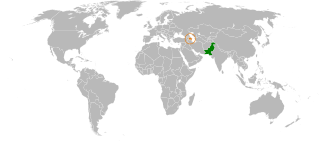Related Research Articles
Dispute resolution or dispute settlement is the process of resolving disputes between parties. The term dispute resolution is sometimes used interchangeably with conflict resolution.

The economy of Pakistan is classified as a developing economy. It is the 24th-largest in terms of GDP based on purchasing power parity (PPP) and 46th largest in terms of nominal GDP. As of 2023, the country has a population of 232 million people. According to the International Monetary Fund (IMF), on a per capita income basis, Pakistan ranked 161st by GDP (nominal) and 138th by GDP (PPP).

The Canada–U.S. softwood lumber dispute is one of the largest and most enduring trade disputes between both nations. This conflict arose in 1982 and its effects are still seen today. British Columbia, the major Canadian exporter of softwood lumber to the United States, was most affected, reporting losses of 9,494 direct and indirect jobs between 2004 and 2009.

The Government of Pakistan, constitutionally known as the Federal Government, commonly known as the Centre, is the national authority of the Islamic Republic of Pakistan, a federal parliamentary republic consisting of four provinces, two autonomous territories and one federal territory.
The Trade Development Authority of Pakistan (TDAP) (Urdu: مقتدرہ ترقی تجارت پاکستان), is a department within the Ministry of Commerce and Textile Industry of the Government of Pakistan. It facilitates and promotes international trade of Pakistan. The current Chief Executive of TDAP is Mr. Muhammad Zubair Motiwala.

The Indian Institute of Foreign Trade (IIFT) is a business school in India. Established in 1963, it works as an autonomous body under the Ministry of Commerce and Industry. It also functions as a civil services training institute. Its main campus is in New Delhi and has additional campuses in Kolkata and Kakinada.
The Trading Corporation of Pakistan (TCP) (Urdu: مشارکتِ پاکستان برائے امورِ تجارت) is a Pakistani state-owned commodity trading company, mainly responsible for export and import of commodities. It also issues tenders for export and import of agricultural products. TCP has its offices across various cities of the country including Karachi, Islamabad, Lahore and Multan.

The Ministry of Defence, is an executive ministry of the federal Government of Pakistan, tasked in defending national interests and territorial integrity of Pakistan. The MoD oversees mission execution of its policies and supervises all agencies of the government directly related to the national security and the Pakistan Armed Forces.

The Ministry of Defence Production abbreviated as MoDP, is an executive ministry of the federal Government of Pakistan with objectives of development and production of ordnance and machinery for the Pakistan Armed Forces.
The Ministry of Commerce ; abbreviated as MoCom), is a Cabinet-level ministry of the Government of Pakistan concerned with economic growth and commerce development and promotion in Pakistan. The administrative head of the ministry is the Commerce Secretary of Pakistan, presently Muhammad Sualeh Ahmad Faruqi. The political head, Minister of Commerce, is required to be the member of Parliament.

The Arms Trade Treaty (ATT) is a multilateral treaty that regulates the international trade in conventional weapons.

Azerbaijan–Pakistan relations refer to bilaterial relations between the Republic of Azerbaijan and the Islamic Republic of Pakistan. Pakistan has an embassy in Baku and Azerbaijan has an embassy in Islamabad. Both countries are enhancing contact between their respective capitals. The two nations are considered "strategic partners".
The Iran Chamber of Commerce, Industries, Mines and Agriculture (ICCIMA) is a non-profit non-governmental institution, established to facilitate economic growth and development in the country. ICCIMA is a forum in the field of industries, mines and agriculture.

European Union–Iran relations are the bilateral relations between Iran and the European Union (EU). The EU is Iran's largest trading partner, along with China and the United Arab Emirates. Trade with Iran is subject to the general EU import regime and the EU supports the goal of Iranian accession to the World Trade Organization (WTO). The EU has accused and criticized Iran for human rights violations, which led to diplomatic tensions, but both sides aim at improving and normalizing relations. Should Turkey's accession to the EU take place, Iran will border the European Union.

The Ministry of Investment, Trade and Industry, abbreviated MITI, is a ministry of the Government of Malaysia that is responsible for international trade, industry, investment, productivity, small and medium enterprise, development finance institution, halal industry, automotive, steel, strategic trade. The ministry has its headquarters located at Menara MITI on Jalan Sultan Haji Ahmad Shah in Kuala Lumpur and the building is also a component of Naza TTDI’s 75.5-acre KL Metropolis, a mixed development that is envisioned to be the International Trade and Exhibition District for Kuala Lumpur. It is one of the three ministries that has not moved to Putrajaya.

The Animal Quarantine Department (AQD) (Urdu: سررشتہ برائے قرنطینہِ حیوانات) is an attached department of the Ministry of National Food Security and Research, responsible for animal quarantine, inspection and certification services in Pakistan. AQD is the lead agency for collaboration with other agencies to protect the wild animals and the livestock industry of Pakistan and other countries from introduction or spread of exotic diseases, by regulating the import, export and quarantine of animals and animal products.
The Commerce and Trade Group (CTG) is a branch of the Central Superior Services of Pakistan. The Commerce and Trade Group is responsible for the commercial diplomacy and economic development of Pakistan. In order to safeguard Pakistan's commercial interests and enhance market access, the CTG was created in 1973 to help Pakistan in developing Pakistan trade ties abroad and to cater the modern needs of specialized officer for trade policy and implementation.
The International Certificate of Origin Guidelines is a set of global guidelines on the issuance of Certificates of Origin published by the International Chamber of Commerce, in Paris, France, rolling out in 2021-2025 and beyond. It "aims to provide chambers of commerce and exporters with updates on new processes, including digitisation of the CO [Certificate of Origin] process". The ICC represents more than 45 million companies in over 100 countries These Guidelines cover Certificates of Origin as used in international trade, as opposed to any other purpose.

EXIM Bank of Pakistan or Export Import Bank of Pakistan is a Development Finance Institution owned by the Government of Pakistan to stimulate the growth and diversification of the country's exports and assist in the implementation of import substitution plans.
The Pakistan Single Window (PSW) stands as a prominent undertaking spearheaded by Pakistan Customs. Its overarching objective is to diminish the time and expenses associated with conducting business by transitioning Pakistan's cross-border trade into a digital realm, thereby eliminating the need for paper-based manual procedures.
References
- 1 2 "MNAs to review trade dispute law". The Express Tribune. September 8, 2021.
- ↑ Abbas, Ghulam (May 16, 2018). "Trade dispute organisation at MoC lacks legal cover to move against delinquent firms".
- ↑ Desk, NNPS (November 10, 2023). "TDA-2022 to establish a comprehensive regime for trade dispute resolution".
- ↑ "Law to resolve international trade disputes on the anvil". www.thenews.com.pk.
- ↑ "Trade Dispute Resolution Organization draft to be introduced in Parliament this year". February 10, 2016.
- ↑ desk, News (August 7, 2023). "Parliament passes Trade Organization (Amendment), Trade Dispute Resolution bills".
{{cite web}}:|first=has generic name (help) - ↑ Butt, Naveed (August 8, 2023). "Joint sitting of parliament passes trade dispute-, trade bodies-related bills". Brecorder.